The global infant incubators & warmers market is estimated to grow from USD 1.1 billion in 2025 to approximately USD 2.3 billion by 2035, recording an absolute increase of USD 1.2 billion over the forecast period. This translates into a total growth of 109.1%, with the market forecast to expand at a compound annual growth rate (CAGR) of 7.5% between 2025 and 2035. The market size is expected to grow by nearly 2.1X during the same period, supported by increasing neonatal care requirements, rising premature birth rates, and growing healthcare infrastructure development in emerging markets.
Between 2025 and 2030, the infant incubators & warmers market is projected to expand from USD 1.1 billion to USD 1.6 billion, resulting in a value increase of USD 0.5 billion, which represents 41.7% of the total forecast growth for the coming years. This phase of growth will be shaped by rising healthcare expenditure, increasing awareness about the importance of neonatal care, and growing government initiatives for improving maternal and child healthcare infrastructure. Medical device manufacturers are expanding their product portfolios to address the growing demand for advanced neonatal care equipment.
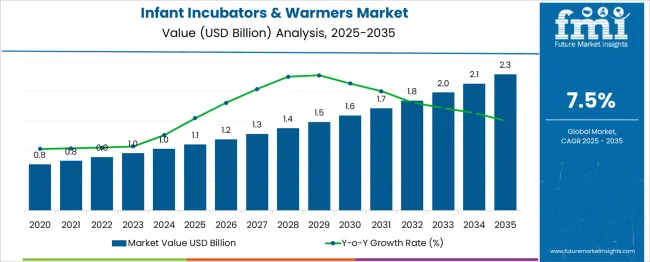
| Metric | Value |
|---|---|
| Estimated Value in (2025E) | USD 1.1 billion |
| Forecast Value in (2035F) | USD 2.3 billion |
| Forecast CAGR (2025 to 2035) | 7.5% |
From 2030 to 2035, the market is forecast to grow from USD 1.6 billion to USD 2.3 billion, adding another USD 0.7 billion, which constitutes 58.3% of the ten-year expansion. This period is expected to be characterized by technological advancements in temperature control systems, integration of IoT capabilities for remote monitoring, and development of energy-efficient incubator models. The growing adoption of hybrid incubator-warmer systems and advanced phototherapy units will drive demand for premium neonatal care equipment with enhanced functionality and safety features.
Between 2020 and 2025, the infant incubators & warmers market experienced steady expansion, driven by increasing focus on reducing infant mortality rates and growing investments in neonatal intensive care units. The market developed as healthcare systems recognized the critical importance of maintaining optimal thermal environments for premature and low-birth-weight infants. Medical professionals and healthcare organizations began emphasizing the importance of advanced incubation technology in improving neonatal outcomes.
Market expansion is being supported by the increasing global incidence of premature births and the corresponding demand for specialized neonatal care equipment. Healthcare facilities worldwide are increasingly focused on improving neonatal survival rates through advanced thermal management solutions that can provide precise temperature control, humidity regulation, and oxygen management. The proven efficacy of modern incubators and warmers in reducing hypothermia-related complications makes them essential equipment in neonatal intensive care units.
The growing focus on improving maternal and child healthcare infrastructure, particularly in developing countries, is driving demand for both basic and advanced incubator systems. Healthcare providers preference for multifunctional equipment that combines incubation, warming, and phototherapy capabilities is creating opportunities for innovative product designs. The rising influence of international health organizations and government initiatives focused on reducing infant mortality is also contributing to increased equipment adoption across different healthcare settings and geographic regions.
The market is segmented by type and region. By type, the market is divided into incubators, infant warmers, and convertible warmers & incubators. Each type is further categorized by value, performance, and premium segments. Regionally, the market is divided into North America, Europe, East Asia, South Asia & Pacific, Latin America, and Middle East & Africa.
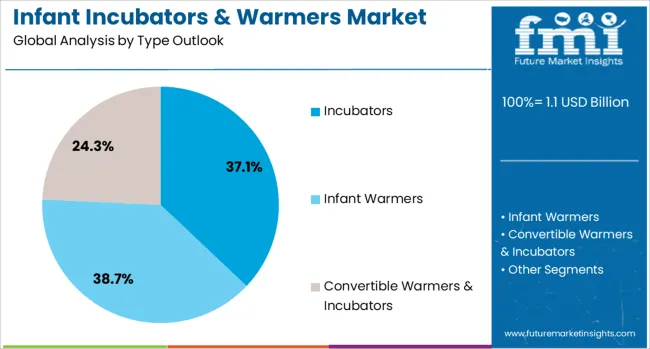
The warmers segment is projected to account for 38.7% of the infant incubators & warmers market in 2025. Infant warmers are widely used because they provide a controlled and stable thermal environment essential for newborns, especially premature or low-birth-weight babies who cannot regulate body temperature effectively. Maintaining optimal warmth prevents hypothermia, reduces metabolic stress, and supports healthy organ function, growth, and development.
They are critical in neonatal intensive care units (NICUs), delivery rooms, and resource-limited settings where maintaining proper ambient temperature is challenging. By enabling continuous monitoring of vital signs and integrating features like humidity and oxygen control, infant warmers improve survival outcomes, reduce complications, and ensure safer postnatal care during the most vulnerable early stages of life.
The infant incubators & warmers market is advancing steadily due to increasing awareness about neonatal care importance and growing healthcare infrastructure development. The market faces challenges, including high equipment costs, maintenance requirements, and a shortage of trained personnel in developing regions. Innovation in product design and technology integration continues to influence equipment development and market expansion patterns.
The growing development of healthcare facilities in emerging economies is enabling broader access to neonatal care equipment. Government initiatives and international funding support are driving establishment of new neonatal intensive care units, particularly in regions with high infant mortality rates. Public-private partnerships are facilitating equipment procurement and training programs, improving neonatal care capabilities in underserved areas.
Modern incubator and warmer manufacturers are incorporating sophisticated monitoring systems, IoT connectivity, and automated control features to enhance equipment functionality and safety. These technologies improve clinical outcomes through precise environmental control while reducing the workload on healthcare staff. Advanced features such as integrated phototherapy, automated weaning modes, and predictive maintenance capabilities are becoming standard in premium equipment offerings.
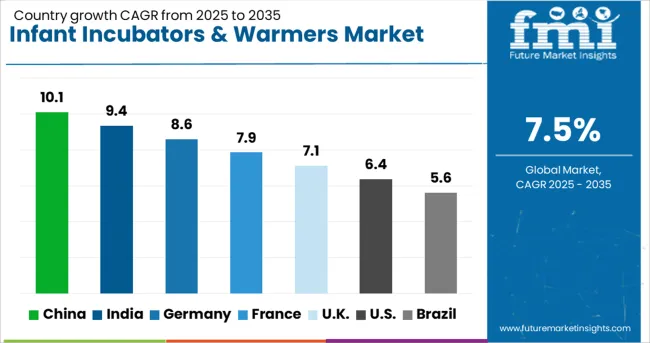
| Countries | CAGR (2025-2035) |
|---|---|
| China | 10.1% |
| India | 9.4% |
| Germany | 8.6% |
| France | 7.9% |
| UK | 7.1% |
| USA | 6.4% |
| Brazil | 5.6% |
The infant incubators & warmers market is experiencing varied growth globally, with China leading at a 10.1% CAGR through 2035, driven by rapid healthcare infrastructure expansion, increasing healthcare spending, and government initiatives to improve maternal and child health outcomes. India follows at 9.4%, supported by growing private healthcare sector investments and increasing awareness about neonatal care importance. Germany shows robust growth at 8.6%, emphasizing technological innovation and premium equipment adoption. France records 7.9%, focusing on healthcare system modernization and quality improvement. The UK demonstrates 7.1% growth, prioritizing NHS investments in neonatal care facilities. The USA shows 6.4% growth, with mature market characteristics and a focus on equipment upgrades.
The report covers an in-depth analysis of 40+ countries; seven top-performing countries are highlighted below.
Revenue from infant incubators & warmers in China is projected to exhibit strong growth with a CAGR of 10.1% through 2035, driven by massive healthcare infrastructure development and government commitment to reducing infant mortality rates. The country's expanding network of hospitals and increasing focus on maternal and child health are creating significant demand for modern neonatal care equipment. Both international and domestic medical device manufacturers are establishing comprehensive distribution networks to serve the growing healthcare sector across tier-1, tier-2, and tier-3 cities.
Revenue from infant incubators & warmers in India is expanding at a CAGR of 9.4%, supported by rapid private healthcare sector expansion, government health programs, and increasing focus on reducing infant mortality rates. The country's large birth rate and improving healthcare accessibility are driving demand for both basic and advanced neonatal care equipment. International medical device companies and domestic manufacturers are expanding their presence to serve the growing demand across urban and rural healthcare facilities.
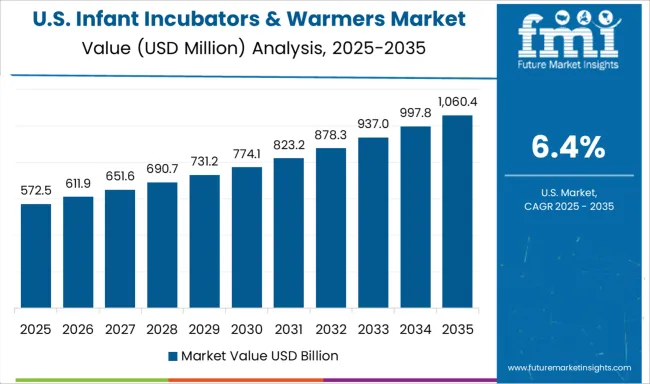
Demand for infant incubators & warmers in the USA is projected to grow at a CAGR of 6.4%, supported by continuous technology advancement and focus on improving neonatal outcomes. American healthcare facilities prioritize equipment with advanced monitoring capabilities, connectivity features, and evidence-based design improvements. The market is characterized by regular equipment replacement cycles and adoption of premium products with enhanced functionality.
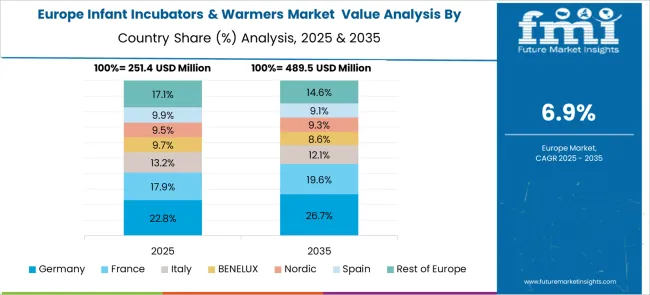
Revenue from infant incubators & warmers in Germany is projected to grow at a CAGR of 8.6% through 2035, supported by the country's strong medical device manufacturing base and focus on clinical excellence. German healthcare facilities consistently demand high-quality, technologically advanced equipment that delivers superior clinical outcomes while maintaining operational efficiency.
Revenue from infant incubators & warmers in France is projected to grow at a CAGR of 7.9% through 2035, supported by comprehensive healthcare system investments and focus on perinatal care quality. French hospitals value equipment reliability, clinical effectiveness, and long-term operational efficiency, positioning advanced incubators as essential investments in neonatal care infrastructure.
Revenue from infant incubators & warmers in the UK is projected to grow at a CAGR of 7.1% through 2035, supported by NHS Long Term Plan commitments to improving maternity and neonatal services. British healthcare facilities prioritize evidence-based equipment selection and comprehensive staff training to maximize clinical benefits.
Revenue from infant incubators & warmers in Brazil is projected to grow at a CAGR of 5.6% through 2035, supported by efforts to improve healthcare access and reduce regional disparities in neonatal care quality. Brazilian healthcare facilities are increasingly investing in modern equipment to meet growing demand and improve clinical outcomes.
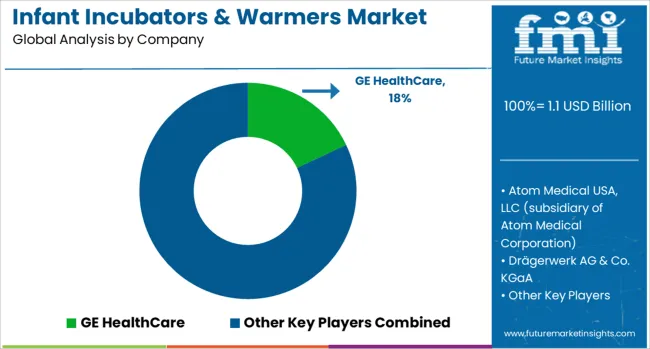
The infant incubators & warmers market is characterized by competition among established medical device manufacturers, specialized neonatal equipment companies, and regional players. Companies are investing in research and development, clinical validation, distribution network expansion, and after-sales service capabilities to deliver reliable, effective, and accessible neonatal care solutions. Product innovation, regulatory compliance, and customer support are central to strengthening market position and building healthcare provider trust.
GE HealthCare leads the market with an 18.0% global value share, offering comprehensive neonatal care solutions with advanced monitoring and control capabilities. Atom Medical USA, LLC (subsidiary of Atom Medical Corporation) provides specialized incubator systems with focus on Japanese quality standards and precision engineering. Drägerwerk AG & Co. KGaA, Germany-based, delivers integrated neonatal care solutions combining incubation, ventilation, and monitoring technologies. nice Neotech Medical Systems Pvt. Ltd., India, focuses on cost-effective solutions for emerging markets with focus on reliability and serviceability.
LEEX LLC and International Biomedical Ltd. provide specialized warming and incubation products with focus on specific clinical applications and market segments. mOm Incubators Ltd. offers innovative designs emphasizing ease of use and clinical effectiveness. Zimed Healthcare Inc. delivers value-oriented solutions for diverse healthcare settings. DIAMEDICAL USA EQUIPMENT LLC provides refurbished and new equipment with comprehensive service support. Médipréma's Group, France-based, specializes in premium neonatal care equipment with focus on clinical innovation. Apothecaries Sundries Mfg. Pvt. Ltd. (ASCO) and BioAge Labs serve regional markets with locally manufactured solutions adapted to specific healthcare needs.
| Items | Values |
|---|---|
| Quantitative Units (2025) | USD 1.1 billion |
| Type | Incubators, Infant Warmers, Convertible Warmers & Incubators |
| Product Positioning | Value, Performance, Premium |
| Regions Covered | North America, Europe, East Asia, South Asia & Pacific, Latin America, Middle East & Africa |
| Countries Covered | United States, Canada, United Kingdom, Germany, France, China, Japan, South Korea, India, Brazil, Australia and 40+ countries |
| Key Companies Profiled | GE HealthCare, Atom Medical USA LLC, Drägerwerk AG & Co. KGaA, nice Neotech Medical Systems Pvt. Ltd., LEEX LLC, International Biomedical Ltd, mOm Incubators Ltd, Zimed Healthcare Inc, DIAMEDICAL USA EQUIPMENT LLC, Médipréma's Group, ASCO, and BioAge Labs |
| Additional Attributes | Dollar sales by equipment type and technology level, regional demand trends, competitive landscape, buyer preferences for advanced features versus basic functionality, integration with hospital information systems, innovations in temperature control, humidity management, and energy efficiency practices |
North America
Europe
East Asia
South Asia & Pacific
Latin America
Middle East & Africa
The global infant incubators & warmers market is estimated to be valued at USD 1.1 billion in 2025.
The market size for the infant incubators & warmers market is projected to reach USD 2.3 billion by 2035.
The infant incubators & warmers market is expected to grow at a 7.5% CAGR between 2025 and 2035.
The key product types in infant incubators & warmers market are incubators, infant warmers, and others.
In terms of type, the warmers segment is set to command 38.7% share in the infant incubators & warmers market in 2025.






Full Research Suite comprises of:
Market outlook & trends analysis
Interviews & case studies
Strategic recommendations
Vendor profiles & capabilities analysis
5-year forecasts
8 regions and 60+ country-level data splits
Market segment data splits
12 months of continuous data updates
DELIVERED AS:
PDF EXCEL ONLINE
Infant Positioning Aids Market Size and Share Forecast Outlook 2025 to 2035
Infant Nutrition Hydrolysate Ingredients Market Size and Share Forecast Outlook 2025 to 2035
Infant Formula DHA Algae Oil Market Size and Share Forecast Outlook 2025 to 2035
Infant Fever Stickers Market Size and Share Forecast Outlook 2025 to 2035
Infant Nutritional Premix Market Size and Share Forecast Outlook 2025 to 2035
Infant Formula Industry Analysis in United States Analysis - Size, Share, and Forecast Outlook 2025 to 2035
Infant Formula Market Analysis - Size, Share, and Forecast Outlook 2025 to 2035
Infant Formula Ingredients Market Analysis - Size, Share & Forecast 2025 to 2035
Infant Care Equipment Market Growth - Trends & Forecast 2025 to 2035
Infant Incubators Market Analysis - Trends & Forecast 2025 to 2035
A2 Infant Formula Market Analysis By Form Type, By Age Group, By Distribution Channel and By Region - Forecast from 2025 to 2035
Probiotic Infant Formula Market – Growth & Infant Nutrition Trends
Malignant Infantile Osteopetrosis Market
Lactose-free Infant Formula Market
Noise-muffling Infant Hat Market
Carbon Dioxide Incubators Market Size and Share Forecast Outlook 2025 to 2035
Pharmaceutical Incubators Market
CNC Slitting Lathes Market Size and Share Forecast Outlook 2025 to 2035
Swine Disease Diagnostic Kit Market Size and Share Forecast Outlook 2025 to 2035
Clad Wood Awning Window Market Size and Share Forecast Outlook 2025 to 2035

Thank you!
You will receive an email from our Business Development Manager. Please be sure to check your SPAM/JUNK folder too.
Chat With
MaRIA